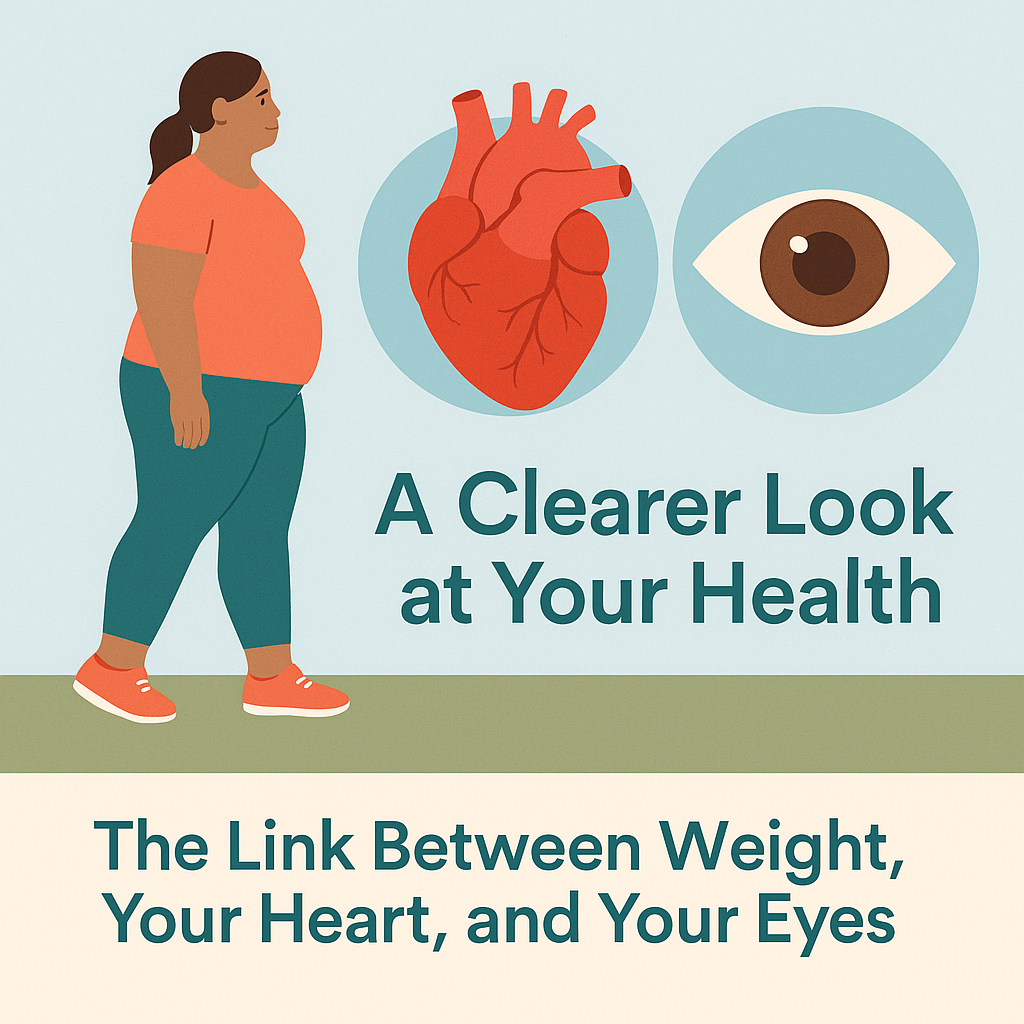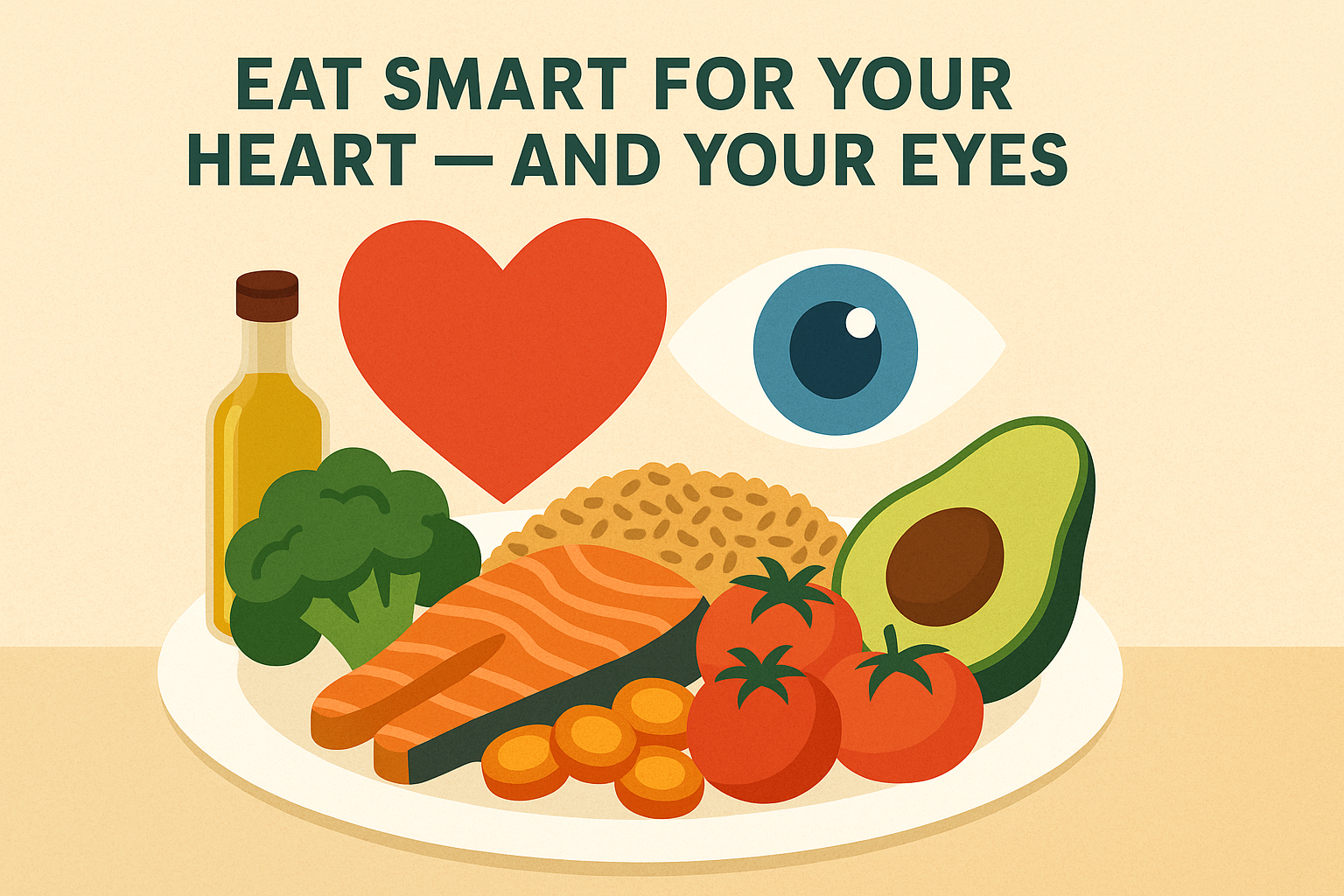⚖️ A Clearer Look at Health: How Weight Management Supports Both Your Heart and Your Eyes
Maintaining a healthy weight isn’t just about heart health — it’s also about protecting your vision. Learn how weight management supports cardiovascular function and helps reduce risks associated with Age-Related Macular Degeneration (AMD).
❤️ The Connection Between Heart Health and Vision
In our earlier post, The Intertwined Relationship Between Age-Related Macular Degeneration and Cardiovascular Health, we explored how the health of your heart and your eyes are deeply linked.
The same network of blood vessels that supplies oxygen and nutrients to your heart also feeds your retina — the light-sensitive tissue responsible for clear, detailed vision. When cardiovascular health is compromised by conditions such as high blood pressure, high cholesterol, or diabetes, these delicate vessels in the eyes can also be affected, increasing the risk of Age-Related Macular Degeneration (AMD) and other vision problems.
In short, what’s good for your heart is good for your eyes — and maintaining a healthy weight is one of the most powerful ways to protect both.
⚖️ Why Weight Matters for Cardiovascular and Vision Health
Carrying excess weight places additional strain on your heart. Over time, this can contribute to:
- High blood pressure (hypertension): Extra weight increases pressure on artery walls, damaging blood vessels that nourish the retina.
- High cholesterol: Excess “bad” (LDL) cholesterol can form plaques that block arteries and reduce oxygen flow to both the heart and eyes.
- Type 2 diabetes: Obesity is one of the strongest risk factors for insulin resistance, which can lead to diabetic eye disease and increase AMD risk.
By managing your weight, you’re not only strengthening your heart — you’re also supporting the microscopic circulation that keeps your vision clear and healthy.
🧠 How to Keep a Healthy Weight
1. Stay in the Know
Your doctor or healthcare professional can help you determine a healthy weight for your age, body type, and lifestyle. A healthy weight helps your heart, brain, and circulation work more efficiently.
2. Learn Your BMI
Your Body Mass Index (BMI) is a quick way to estimate if your weight is in a healthy range.
- Healthy BMI: Below 25
-
Underweight: Below 18.5
You can calculate your BMI online or ask your healthcare provider to interpret it in the context of your overall health.
3. Understand Calories
Calories measure the energy your body gets from food and drinks. Eating more calories than your body uses leads to weight gain, while eating fewer can lead to weight loss.
Balancing calorie intake with daily activity helps maintain a stable, healthy weight.
4. Portions Matter
Even healthy foods can add up. Pay attention to portion sizes — and remember that restaurant portions are often larger than necessary. Using smaller plates or measuring cups can help you learn what a balanced serving looks like.
🥗 Eat Smart: Simple Nutrition Tips for Weight Management
- Add more fiber and water. Fiber-rich foods like vegetables, fruits, beans, and whole grains help you feel full and improve digestion.
- Include protein at breakfast. Eggs, Greek yogurt, or nut butter can help you stay full longer and reduce mid-morning snacking.
- Avoid fast food when possible. These meals are often high in calories, salt, and unhealthy fats that raise cardiovascular risks.
- Read nutrition labels. Check calories and portion sizes per serving. Many packaged foods contain multiple servings.
- Limit sugary drinks. Water, herbal tea, or sparkling water with lemon are great alternatives.
These small, consistent choices make a big impact over time — not just on the scale, but on your cardiovascular and ocular health.
🏃 Get Active — Move for Your Heart and Eyes
Physical activity doesn’t have to mean intense workouts. Even simple daily movement improves circulation and reduces stress.
- Aim for 150 minutes of moderate activity per week, like walking, cycling, or gardening.
- Add strength exercises twice weekly to maintain muscle and metabolism.
- Remember: movement also reduces stress, which helps control cravings and supports heart rhythm and blood flow to the eyes.
💬 Tips for Success
- Start small. Replace one sugary snack with fruit, or take a short walk after dinner.
- Make it social. Invite friends or family to join — shared goals increase motivation.
- Be consistent. Small daily habits are more effective than drastic, short-term diets.
- Ask for help. If you need support, talk to your doctor or registered dietitian for personalized guidance.
👁️ The Takeaway: One Healthy System
When you maintain a healthy weight, you’re doing far more than improving your appearance or energy levels — you’re actively protecting the systems that sustain life and vision. A strong heart ensures that your eyes receive the oxygen and nutrients they need.
By managing your weight, you’re taking a daily step toward protecting your heart, eyes, and overall well-being for years to come.
Healthy weight. Healthy heart. Healthy vision.
Disclaimer:
Always consult your healthcare professional before starting a new diet, exercise, or weight management program, especially if you have pre-existing medical conditions.
References:
-
American Heart Association. Life’s Essential 8: Updating and Enhancing the American Heart Association’s Construct of Cardiovascular Health. Circulation. 2022. https://www.ahajournals.org/doi/10.1161/CIR.0000000000001078 AHAlife+2professional.heart.org+2
-
American Heart Association. Life’s Essential 8 – Eat Better. 2022. https://www.heart.org/en/healthy-living/healthy-lifestyle/lifes-essential-8 www.heart.org+1
-
Bosello F., et al. “Obesity, body fat distribution and eye diseases.” PMC (PubMed Central). 2024. https://pmc.ncbi.nlm.nih.gov/articles/PMC11074037/ PMC
-
Jaisankar D., et al. “Association of obesity and age-related macular degeneration … a systematic review of prospective population-based studies.” 2018. PMC. https://www.ncbi.nlm.nih.gov/articles/PMC6032723/ PMC
-
Optometry Advisor. “Weight Loss May Improve Ocular Health, But More Study Findings Are Inconclusive.” 2023. https://www.optometryadvisor.com/features/weight-loss-may-improve-ocular-health-but-study-findings-are-inconclusive/ Optometry Advisor
-
Opto.ca. “The link between obesity and eye health.” April 2024. https://opto.ca/eye-health-library/link-between-obesity-and-eye-health Canadian Association of Optometrists
-
European Society of Cardiology. “Obesity: generalities and lifestyle interventions.” https://www.escardio.org/Councils/Council-for-Cardiology-Practice-(CCP)/Cardipractice/part-i-highlights-from-the-clinical-consensus-statement-by-the-european-society




Leave a comment
This site is protected by hCaptcha and the hCaptcha Privacy Policy and Terms of Service apply.